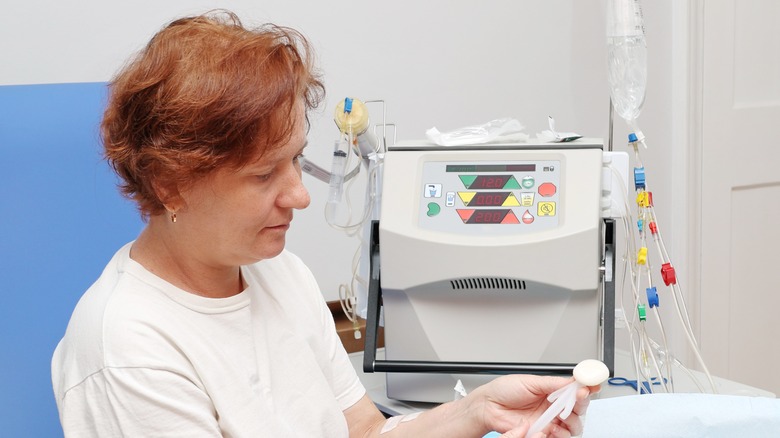Why You Might Want To Stay Out Of A Hot Tub While Undergoing Dialysis
There are many precautions you must take when undergoing dialysis. This treatment, which is used to clean your blood when your kidneys can no longer do so, requires that you take care of your access site and avoid infection. It also means being careful about doing activities that can put extra pressure on your kidneys. Believe it or not, hot tubs and jacuzzis may be something you want to avoid if you're currently undergoing dialysis. According to a report in The Lancet from 2003, a man with kidney failure used a jacuzzi the day before dialysis treatment (via WebMD). After the treatment, the man experienced significant pain and sought medical care. It was discovered that during his time in the hot tub, the man's left kidney had been damaged and was bleeding into his abdomen.
The man was able to make a full recovery, but it was clear to doctors that his injury was caused by the water pressure in the jacuzzi and made worse during dialysis. While this is a rare case, it's definitely something to be aware of if you are currently undergoing dialysis. You may enjoy soaking in a hot tub on a regular basis, but it's important to talk to your doctor about the risks before taking a dip, especially if you are undergoing medical treatments.
What to know about dialysis
Dialysis is a treatment that filters and purifies the blood using a machine. It is usually done when the kidneys can no longer perform their normal functions. There are two types of dialysis: hemodialysis and peritoneal dialysis (via Cleveland Clinic). Hemodialysis is the most common type of dialysis. In hemodialysis, your blood is pumped through a special filter that removes waste and extra fluids from your body. The clean blood is then returned to your body. Peritoneal dialysis is different from hemodialysis because it uses the lining of your abdomen as a natural filter. During peritoneal dialysis, a sterile solution called dialysate is infused into your abdomen through a catheter. The dialysate absorbs waste and extra fluid from your blood right through the walls of your abdomen into the dialysate. Then, the used dialysate is drained from your abdomen, taking the waste and extra fluid with it.
There are many things to consider before starting dialysis. You and your doctor will need to decide which type of dialysis is best for you. You will also need to think about how dialysis will fit into your lifestyle. For example, hemodialysis usually requires you to go to a dialysis center three times a week for treatments that last four hours each. Peritoneal dialysis can be done at home, but it still requires some time and planning. You will also need to have a catheter placed in your abdomen, which carries some risks.
How can you keep your kidneys healthy?
The only way to avoid dialysis is to keep your kidneys healthy enough that you'll never need the treatment. While there are many factors that affect your risk of developing kidney failure, there are some things you can do to maintain good kidney health. First, it's important to control your blood pressure (via Healthline). High blood pressure is a leading cause of kidney disease, so keeping it in check is essential for preventing damage to your kidneys. You can help control your blood pressure by eating a healthy diet, exercising regularly, and avoiding tobacco use. If you have high blood pressure, your doctor may also prescribe medication to help lower it.
In addition to controlling your blood pressure, you should also take steps to manage your diabetes if you have the condition. Diabetes is another leading cause of kidney disease, so keeping your blood sugar levels under control is crucial for protecting your kidneys. You can manage diabetes by following a healthy diet, exercising regularly, and taking medication as prescribed by your doctor. Staying hydrated, refraining from smoking, and managing your weight are also important for preventing kidney damage. If you have a family history of kidney disease, you may be at increased risk for developing the condition yourself. In this case, it's especially important to take measures to keep your kidneys healthy.



